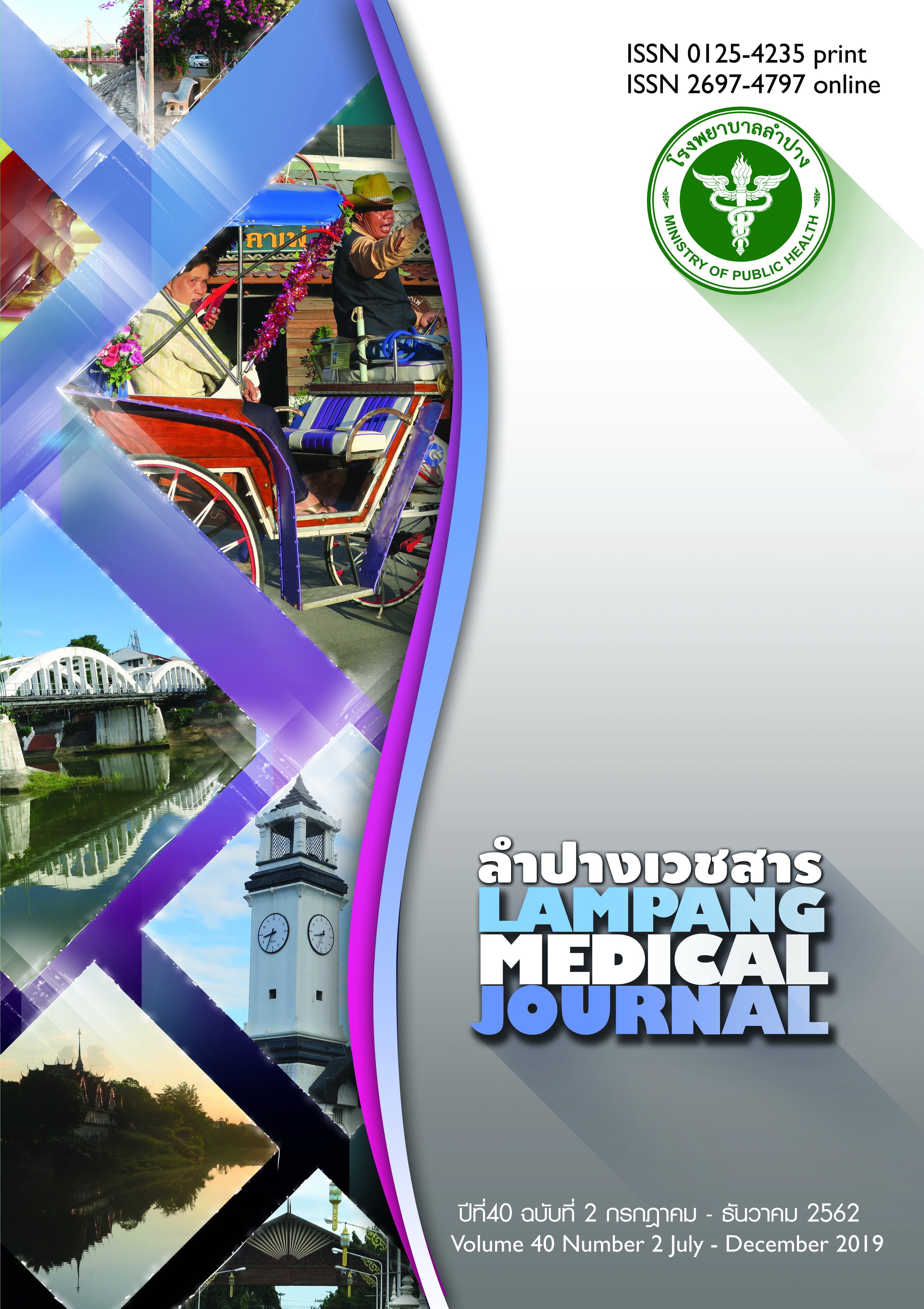Safety and clinical outcomes of Transcatheter Device Closure of Atrial Septum Defect in Adults at Lampang Hospital
Main Article Content
Abstract
Background: Atrial septal defect (ASD) is a common congenital heart disease in adults. Transcatheter device closure of ASD secundum type (TC-ASD) is a standard treatment and has been implemented at Lampang Hospital since 2015.
Objective: To determine safety and clinical outcomes of adult patients after receiving TC-ASD at
Lampang Hospital.
Material and method: A retrospective cohort study was conducted among patients over 18 years of age, diagnosed with ASD secundum type, who underwent TC-ASD with the Cocoon septal occulder devices at Lampang Hospital between July 2015 and September 2018. The complications and clinical outcomes were recorded and statistically compared at 1, 6 and 12 months of follow-ups.
Results: There were 29 patients with the mean age of 55.5 ± 13.8 years (range 21-81). Twenty cases were female (69%). The mean size of ASD measured by transthoracic echocardiography (TTE) was 19.9 ± 5.1 mm (range 12-29). The mean size of ASD closure device was 27.4 ± 4.9 mm (range 6-36). The success rate of the procedure was 100%. One patient (3.5%) had a residual ASD shunt at 1 month and spontaneous closure at 6 months. Significant improvement of TTE parameters after 1-month included right ventricular diastolic diameter, tricuspid regurgitation pressure and right ventricular systolic pressure. The mean pulmonary arterial pressure was significantly decreased at 12 months. No major complications were observed. One patient (3.5%) developed supraventricular tachycardia at 6-month and received radiofrequency ablation. All patients had functional class improvement to NYHA 1 at 1, 6 and 12 months of follow-ups (p<0.001).
Conclusion: TC-ASD in adult patients is safe and effective in terms of clinical improvement and significant reduction of TTE parameters after 1-12 months after the procedure.
Article Details
บทความที่ส่งมาลงพิมพ์ต้องไม่เคยพิมพ์หรือกำลังได้รับการพิจารณาตีพิมพ์ในวารสารอื่น เนื้อหาในบทความต้องเป็นผลงานของผู้นิพนธ์เอง ไม่ได้ลอกเลียนหรือตัดทอนจากบทความอื่น โดยไม่ได้รับอนุญาตหรือไม่ได้อ้างอิงอย่างเหมาะสม การแก้ไขหรือให้ข้อมูลเพิ่มเติมแก่กองบรรณาธิการ จะต้องเสร็จสิ้นเป็นที่เรียบร้อยก่อนจะได้รับพิจารณาตีพิมพ์ และบทความที่ตีพิมพ์แล้วเป็นสมบัติ ของลำปางเวชสาร
References
Masura J, Gavora P, Podnar T. Long-term outcome of transcatheter secundum-type atrial septal defect closure using Amplatzer septal occulders. J Am Coll Cardiol. 2005;45(4):505-7.
Luermans JG, Post MC, ten Berg JM, Plokker HW, Suttorp MJ. Long-term outcome of transcatheter secundum-type atrial septal defect closure in adults. EuroIntervention. 2010;6(5):604-10.
Hengrussamee K, Katekangplu P, Porapakkham P, Plainetr V, Kanoksin A, Assavahanrit J, et al. Immediate, short and intermediate results of transcatheter closure of secundum-type atrial septal defect using Amplatzer septal occulder devices. J Med Assoc Thai. 2008;91(7):995-1001.
Warnes CA, Williams RG, Bashore TM, Child JS, Connolly HM, Dearani JA, et al. ACC/AHA 2008 guidelines for the management of adults with congenital heart disease: a report of the American College of Cardiology/American Heart Association Task Force on Practice Guidelines (writing committee to develop guidelines on the management of adults with congenital heart disease). Developed in collaboration with the American Society of
Echocardiography, Heart Rhythm Society, International Society for Adult Congenital Heart Disease, Society for Cardiovascular Angiography and Interventions, and Society of Thoracic Surgeons. J Am Coll Cardiol. 2008;52(23):e143-e263.
Butera G, Biondi-Zoccai G, Sangiorgi G, Abella R, Giamberti A, Bussadori C, et al. Percutaneous versus surgical closure of secundum atrial septal defects: a systematic review and meta-analysis of currently available clinical evidence. EuroIntervention. 2011;7(3):377-85.
Jampates S, Hengrussamee K. A comparative study of outcomes after transcatheter closure of secundum-type atrial septum defect in adults younger than 60 years and the older ones. J Med Assoc Thai.2014;97(11):1133-9.
Moore J, Hegde S, El-Said H, Beekman R, Benson L, Bergersen L, et al. Transcatheter device closure of atrial septal defects: a safety review. JACC Cardiovasc Interv.2013; 6(5): 433-42.
Krumsdorf U, Ostermayer S, Billinger K, Trepels T, Zadan E, Horvath K, et al. Incidence and clinical course of thrombus formation on atrial septal defect and patient foramen ovale closure devices in 1,000 consecutive patients. J Am Coll Cardiol. 2004;43(2):302-9.
Humenberger M, Rosenhek R, Gabriel H, Rader F, Heger M, Klaar U, et al. Benefit of atrial septal defect closure in adults: impact of age. Eur Heart J. 2011;32(5):553-60.
Akagi T. Current concept of transcatheter closure of atrial septal defect in adults. J Cardiol. 2015;65(1):17-25.


